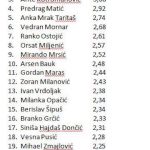“In the efforts to address the migrant crisis, leaders of the European Union give priority to the implementation of a joint action plan with Turkey and plan to hold a special meeting with Turkey early next month”, said on the European Council President Donald Tusk on February 19, 2016. “We have agreed that a joint action plan with Turkey remains a priority and we must do everything to make it work. Therefore, we intend to organize a special meeting with Turkey in March”, said Tusk after the first day of an EU summit in Brussels.
“Prior to today’s meeting, there were those who doubted the need to address the refugee crisis together with Turkey. Now, we have confirmed that there is no alternative to good, intelligent and wise cooperation with that country”, said the European Commission President Jean-Claude Juncker.
The draft conclusions of the European Council say that the aim is to rapidly reduce the influx of migrants, to protect the external borders, reduce illegal migration and preserve the integrity of the Schengen area. It also says that a continuous inflow of illegal migrants along the Western Balkan route is causing “serious concern” and, therefore, requires coordinated action. “It is important to remain vigilant regarding the possible development of new routes so that we can take swift and concerted action”, read the draft conclusions.
“Austria will introduce on Friday a daily limit on the number of migrants, despite the criticism from the European Commission”, said Austrian Interior Minister Johanna Mikl-Leitner. Austria has decided not to receive more than 3,200 migrants a day, whether they plan to continue on to Germany or to seek asylum in Austria. “We will start on Friday as planned”, said Mikl-Leitner.
European Commissioner for Migration Dimitris Avramopoulos sent a letter to the Austrian government on Thursday in which he warned them that the introduction of such restrictions was a violation of the European and international law. “Such a policy simply will not be in accordance with the Austrian obligations under the European and international law”, he said, referring to the Geneva Convention and the European Convention on Human Rights. “Austria has a legal obligation to accept all applications for asylum made on its territory or at the border”, he noted, calling on the Austrian government to reconsider its decision.
Driven by the Austrian plan, the Slovenian government on Thursday said it would step up controls on the Schengen border with Croatia. According to the decision, Slovenia will return to Croatia those migrants who do not fulfil the conditions for entry and who have not applied for asylum. Slovenian Interior Minister Vesna Gyorkos Žnidar said that Slovenia would accept migrants only within the quota imposed by Austria.
Arriving at the EU summit on Thursday, Croatian Prime Minister Tihomir Orešković said he expected a long debate about the migrant crisis and emphasized that the most important thing for Croatia was to communicate and coordinate its activities with its neighbours. “This is a serious situation, but we need to see how the situation will develop in the next three to four weeks. It is important that we work together and that we communicate with each other. This is not just a Balkan problem, but a European problem as well. This is a big challenge that we will need to address together as Europe”, said Orešković.









